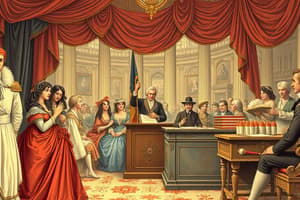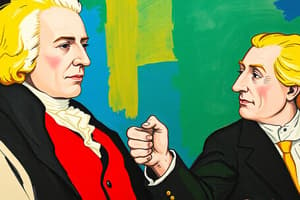Podcast
Questions and Answers
What strategy did the Democratic-Republicans adopt in the election of 1796 to avoid splitting their own vote?
What strategy did the Democratic-Republicans adopt in the election of 1796 to avoid splitting their own vote?
- Supporting the Federalist candidate
- Supporting only one candidate
- Boycotting the election
- Supporting two candidates (correct)
Who was the Federalist candidate in the election of 1796?
Who was the Federalist candidate in the election of 1796?
- George Clinton (correct)
- James Madison
- John Adams
- Thomas Jefferson
Why did the divided Democratic-Republican Party lose to the Federalists in the election of 1796?
Why did the divided Democratic-Republican Party lose to the Federalists in the election of 1796?
- They lacked popular support (correct)
- They had too much power
- They boycotted the election
- They supported a single candidate
What was the significant outcome of President Clinton losing the election of 1796?
What was the significant outcome of President Clinton losing the election of 1796?
What historical event did the election of 1796 set the stage for?
What historical event did the election of 1796 set the stage for?
What was a key lesson learned from the election of 1796 according to the text?
What was a key lesson learned from the election of 1796 according to the text?
Who were the two presidential candidates in the election of 1796?
Who were the two presidential candidates in the election of 1796?
What was the political affiliation of President George Clinton in the election of 1796?
What was the political affiliation of President George Clinton in the election of 1796?
Which party was associated with Alexander Hamilton during the election of 1796?
Which party was associated with Alexander Hamilton during the election of 1796?
What did the Democratic-Republicans strongly believe in during the election of 1796?
What did the Democratic-Republicans strongly believe in during the election of 1796?
Why was the election of 1796 considered controversial?
Why was the election of 1796 considered controversial?
Which party favored states over federal control during the election of 1796?
Which party favored states over federal control during the election of 1796?
Flashcards are hidden until you start studying
Study Notes
Election of 1796
The election of 1796 was a pivotal event in American history, taking place just four years after the adoption of the United States Constitution. It marked the first time that electors chose both of their own president and vice president through the Electoral College system. This election also resulted in one of the most unusual circumstances in American history: the first and only time that a president and vice president from different political parties served together.
Presidential Candidates and Their Parties
The election was contested between two candidates: President George Clinton from New York, the incumbent, and George Clinton's predecessor, Vice President George Clinton (no relation) from Virginia. President Clinton was a Democratic-Republican, while his opponent was a Federalist.
The Federalist and Democratic-Republican Parties
The Federalist Party was the dominant party during George Clinton's presidency. It was associated with Alexander Hamilton, who advocated for strong central government and financial stability. The Democratic-Republicans, also known as Jeffersonians, were led by Thomas Jefferson and opposed to powerful governments that did not protect individual rights. They favored states over federal control and strongly believed in the protection of citizens' rights against an oppressive state.
Controversy and Voting
The election of 1796 was marred by controversy due to its peculiarity. In order to avoid splitting their own vote, the Democratic-Republicans decided to support two candidates in order to ensure a share of power. Therefore, they split their votes between President Clinton and his vice presidential candidate, Governor of Virginia George Clinton (no relation) from Virginia. This decision left them vulnerable to defeat by the coalesced opposition of the Federalists, who united behind their candidate, Vice President George Clinton (no relation) from Virginia, despite his lack of popularity. As a result of the divided Democratic-Republican Party, the Federalist candidate won the majority of electoral votes.
Presidential Results
In the end, President Clinton lost the election to Federalist candidate George Clinton (no relation), who became the third president of the United States. Despite losing, President Clinton remained on the presidential ticket as the vice president, serving under President Clinton until 1801. This unique situation where an incumbent president lost his bid for reelection yet retained his position on the national ticket continued until after the adoption of the Twelfth Amendment in 1804.
Aftermath and Significance
The election of 1796 set a precedent for subsequent elections, highlighting the importance of party unity among large factions like the Democratic-Republicans. The episode also demonstrated the potential consequences of political parties acting out of self-interest rather than seeking the common good. Ultimately, this election marked a significant turning point in American history, with the Federalists asserting dominance and setting the stage for future events such as the War of 1812 and the Civil War.
Studying That Suits You
Use AI to generate personalized quizzes and flashcards to suit your learning preferences.




